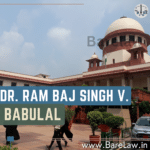
State of Rajasthan v Vidhyawati (1962) Supp 2 SCR 989
Facts:
In this case, Vidhyawati, a widow, was a resident of Rajasthan and was working as a teacher in a government-aided school. Her husband, who was also a teacher in the same school, died in 1953 while in service. The State government provided a scheme for the grant of liberalized pension to the widows of government employees who died while in service, but this scheme was not extended to the widows of government-aided school teachers. Vidhyawati made representations to the government seeking the extension of the scheme to the widows of government-aided school teachers, but her requests were not granted.
Issue:
Whether the government’s failure to extend the scheme for the grant of liberalized pension to the widows of government-aided school teachers violates the fundamental rights guaranteed by the Indian Constitution.
Judgment:
The Supreme Court of India held that the government’s failure to extend the scheme for the grant of liberalized pension to the widows of government-aided school teachers violates the fundamental rights guaranteed by the Indian Constitution.
The Court held that the discrimination between the widows of government employees and the widows of government-aided school teachers is arbitrary and has no reasonable basis. The Court held that the right to equality before the law and equal protection of the law is a fundamental right guaranteed by the Indian Constitution, and the government cannot discriminate between similarly situated persons without any reasonable basis.
The Court directed the State government to extend the scheme for the grant of liberalized pension to the widows of government-aided school teachers, and to pay the arrears of pension due to Vidhyawati. The Court also directed the State government to pay Vidhyawati’s costs.
Summary:
The decision in State of Rajasthan v. Vidhyawati was that the government’s failure to extend the scheme for the grant of liberalized pension to the widows of government-aided school teachers violates the fundamental rights guaranteed by the Indian Constitution.
The Supreme Court of India held that the discrimination between the widows of government employees and the widows of government-aided school teachers is arbitrary and has no reasonable basis.
The Court directed the State government to extend the scheme for the grant of liberalized pension to the widows of government-aided school teachers, pay the arrears of pension due to Vidhyawati, and pay her costs.
The decision established that the right to equality before the law and equal protection of the law is a fundamental right guaranteed by the Indian Constitution, and the government cannot discriminate between similarly situated persons without any reasonable basis.
State of Rajasthan v. Vidhyawati was a case heard by the Supreme Court of India in 1962. The case involved a widow named Vidhyawati, who was working as a teacher in a government-aided school in Rajasthan.
Her husband, who was also a teacher in the same school, died while in service, and she sought the extension of a scheme for the grant of liberalized pension to the widows of government employees who died while in service, which was not extended to the widows of government-aided school teachers.
Vidhyawati’s requests were denied by the government, and she approached the court seeking relief.
The central issue in the case was whether the government’s failure to extend the scheme for the grant of liberalized pension to the widows of government-aided school teachers violates the fundamental rights guaranteed by the Indian Constitution.
The Supreme Court held that the discrimination between the widows of government employees and the widows of government-aided school teachers is arbitrary and has no reasonable basis.
The Court established that the right to equality before the law and equal protection of the law is a fundamental right guaranteed by the Indian Constitution, and the government cannot discriminate between similarly situated persons without any reasonable basis.
The decision in this case had significant implications for the protection of fundamental rights in India and reinforced the importance of ensuring equal treatment for all citizens under the law.





